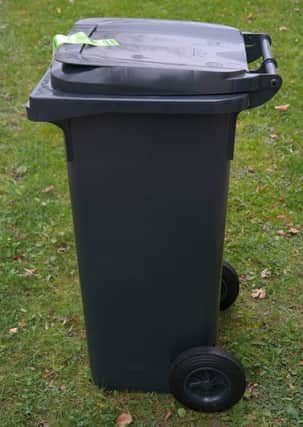Mid and East Antrim Council considers three-weekly bin collections


The move was part of a range of proposals discussed at a meeting of the council’s Operational Committee in Carrickfergus on Monday evening.
The bin collection move could form part of the council’s Transformation of Waste Services Plan, which aims to boost recycling to meet the council’s statutory target of 50 per cent by 2020 to avoid “significant fines” and reduce the £3.5 million annual bill from waste sent to landfill.
Advertisement
Hide AdAdvertisement
Hide AdThe council’s current recycling rate has reportedly “plateaued” at 44.6 per cent and it spends £13.5 million per annum on waste services.
A report presented to councillors advises that they must follow the lead of councils such as Falkirk in Scotland and Conwy in Wales, who successfully adopted a “staged approach to recycling.”
In addition to reducing the frequency of the black bin collection, food waste would be banned from black bins throughout the borough as part of the first step in a three-stage system.
This would be supported by educational materials, 150 free caddy liners per annum and other infrastructure.
Advertisement
Hide AdAdvertisement
Hide AdThe second stage would involve the introduction of triple stack kerb side collection containers in Ballymena, Carrickfergus and Larne, with a final report on this to be brought back to council in January.
The third stage, subject to the approval of options and recycling performance, would see consideration given to three-weekly black bin collections. A final report on this will also be brought back to council in January.
A pilot WRAP scheme to promote the separation of food waste has already been introduced in 2000 households in Ballymena and 500 in Larne, recovering approximately three tonnes of food waste a week. However, a council report revealed that only 15 to 20 per cent of the households involved in the pilot are using the scheme.
The report advocates the adoption of a “more rigid approach” to the collection of food waste, which it says would “support the delivery of landfill diversion targets, reduce costs and aid the re-engagement of citizens with sustainable waste management.”
Advertisement
Hide AdAdvertisement
Hide AdThis would see a three-stage warning system implemented for bins found to contain food waste.
On the first occasion, the bin would be collected but the customer would be “advised to remove food waste in future.”
Should it happen again, the customer would be “advised to contact waste services to have the bin collected” with the Waste Services department advising the customer of the policy and providing support if required.
However, a third reoccurrence would result in the bin not being collected until the waste is removed.
Advertisement
Hide AdAdvertisement
Hide AdThe council’s Head of Waste Stephen Holgate told elected members that the council didn’t “intend to start to rummage through people’s black bins” but could monitor the frequency with which brown bins are put out for collection.
“If we consistently don’t have a brown bin out we know there’s a problem and we will take a look and check,” he said.
He added that the plan being proposed was the “least invasive option” for householders.
“If we’re able to lift three tonnes of waste a week for 200 homes that gives you and idea of the volume of food waste available throughout the borough,” he stated.
Advertisement
Hide AdAdvertisement
Hide Ad“We are paying £97 a tonne for landfill, imagine that on the scale of Mid and East Antrim.”
Mr Holgate added that as the plan was taken through each stage and the impact on recycling from each step clarified then the next step could be considered.
“We can see if we want to consider triple stacks or sticking with kerb side bin collections and if we want to consider three week or four week collection,” he stated.
The council’s Director of Environmental Services Philip Thompson said that reducing food waste could save each home an estimated £600 a year.
The proposals were welcomed by elected representatives.
Advertisement
Hide AdAdvertisement
Hide Ad“Change is always difficult, we need to embrace change and I think education is vitally important as well as not going in with heavy handedness,” said UUP Councillor John Stewart.
Alliance Alderman Gerardine Mulvenna agreed that “education is key” and that there was a need for a “robust communications system” to introduce the changes within a six-month time frame.
DUP Alderman Gregg McKeen said he was “happy to support” the proposals but that “a lot more information” was needed.
UUP Cllr Mark McKinty asked what the rationale was behind plans to close Sullatober and Redlands recycling centres on a Sunday if the council was trying to encourage recycling. However, he was told that the issue would be discussed in closed council, from which the press was barred.
Advertisement
Hide AdAdvertisement
Hide AdCouncillors unanimously agreed the motion, proposed by Ald Mulvenna and seconded by Cllr McKeown, to introduce a ban on food waste in black bins from April 1 2017 alongside the three-stage warning system and the implementation of educational materials and infrastructure.
They also agreed to support the other measures contained in the Transformation of Waste Management Services plan in a motion proposed by Cllr McKeown and seconded by Ald Mulvenna.
When asked by the Times whether the council would still be held to am EU recycling target post-Brexit, a spokesperson said that it was “undetermined pending UK-EU negotiations” but added that “Northern Ireland’s waste management strategy includes a commitment to this target/date.”